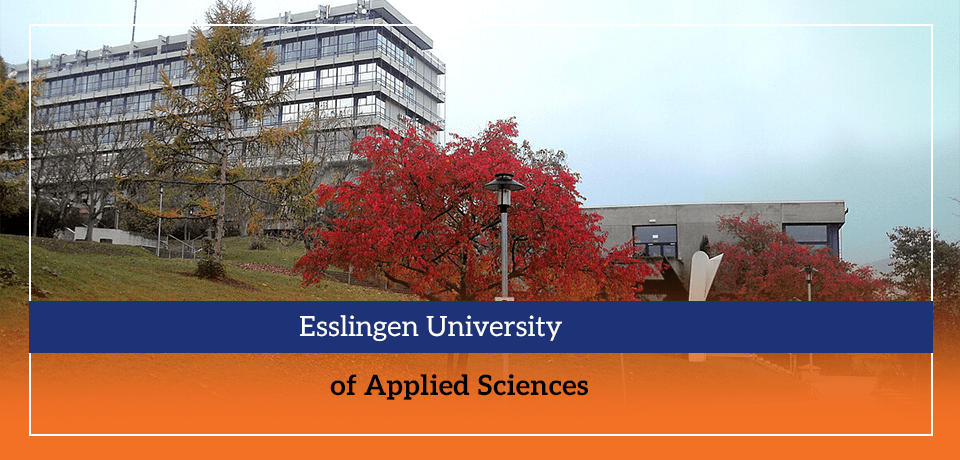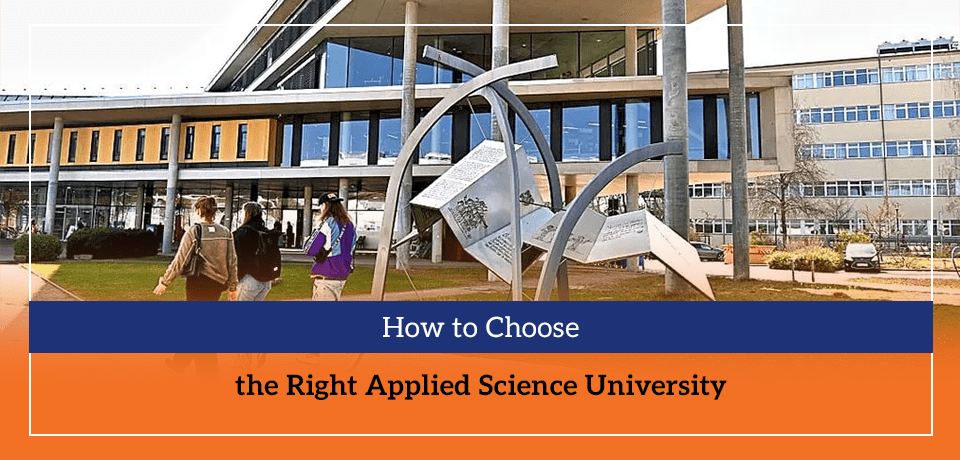Germany has long been renowned for its robust education system and thriving industries, solidifying its position as one of the top European study destinations. It’s now a global leader in practical education. Unlike traditional universities, applied science universities in Germany work closely with companies.
They even include internships in their programs. So, if you love hands-on learning, the schools here are perfect. According to statistics, approximately 80% of UAS graduates secure employment within six months of completing their studies.
In this article, we’ll explore the best applied science universities Germany has to offer in 2026. You’ll learn about their top programs, fees, and career options. We’ll guide you through the best applied science universities in Germany and the Fachhochschule rankings 2026.
What Are Universities of Applied Sciences in Germany?
In Germany, these schools are called Fachhochschulen or UAS (Universities of Applied Sciences). They differ from traditional research universities, although both are part of Germany’s renowned public higher education institutions. They mix theory with real job skills.
Fachhochschulen focus more on practical training and less on deep academic research. You don’t just study in classrooms. These schools have strong links with industries. One prominent feature is the mandatory internship. Almost every student has to complete one.
Students also have the opportunity to work in labs, utilise modern tools, and visit companies. Many German students prefer UAS because they offer a smoother path to jobs. More than one-third of students in Germany choose universities specialising in applied sciences.
There’s often a debate: Fachhochschule vs Universität. Both are good, but they serve different goals. Universities tend to focus more on theoretical research and extended academic study. Fachhochschulen are best for fast, career-focused learning.
If you want to start working soon after graduation, the University of Alaska System (UAS) is a smart choice. You get skills that companies need today.

Top 10 Applied Science Universities in Germany (2026)
Here is our list of the top 10 best Fachhochschulen in Germany.
1. FH Aachen University of Applied Sciences
Location: Aachen and Jülich
FH Aachen is one of Germany’s leading universities of applied sciences. It offers a strong focus on engineering and technology. The university has two main campuses: Aachen and Jülich. These campuses provide modern labs and research centres.
The university offers Bachelor’s and Master’s degrees in various applied science fields. It emphasises practical training and industry collaboration. Students benefit from hands-on projects and internships.
Key Programs:
- Aerospace Engineering
- Applied Chemistry
- Applied Mathematics and Informatics
- Architecture
- Automotive and Drive Engineering
- Biomedical Engineering
- Biotechnology
- Civil Engineering
- Computer Science
- Electrical Engineering
- Mechanical Engineering
- Mechatronics
- Medical Engineering
- Physical Engineering
Average Semester Fees: €310.
2. TH Köln (Cologne University of Applied Sciences)
Location: Cologne
TH Köln is one of the biggest applied sciences universities in Germany. It has three main campuses in Cologne, Gummersbach, and Leverkusen. The university is recognised for its innovation, research, and strong practical focus.
TH Köln offers over 100 Bachelor’s and Master’s degree programs in total. They cover applied sciences, engineering, media, social sciences, and design. The learning here is very hands-on, and students work on real-world projects.
Key Programs in Applied Sciences:
- Automation and IT
- Computer Science
- Electrical Engineering
- Integrated Design
- Mechanical Engineering
- Mechatronics
- Production and Logistics
- Renewable Energies
- Applied Natural Sciences
- Medical Engineering
- Process Engineering
Average Semester Fees: €300-€320.
3. HTW Berlin (University of Applied Sciences)
HTW Berlin, or Hochschule für Technik und Wirtschaft Berlin, is the largest University of Applied Sciences in Berlin and Eastern Germany. It has two main campuses: Treskowallee and Wilhelminenhof. It has over 14,000 students, with a significant proportion of international students.
The university offers approximately 75 programs, including bachelor’s and master’s degrees. Some programs are taught in English and are designed to cater to international students.
Key Programs in Applied Sciences:
- Computer Engineering
- Electrical Engineering
- Mechanical Engineering
- Civil Engineering
- Life Science Engineering
- Renewable Energy Systems
- Automotive Engineering
- Applied Computer Science
- Industrial Design
- Game Design
Average Semester Fees: Approximately €302.
4. Darmstadt University of Applied Sciences (h_da)
Darmstadt University of Applied Sciences is in the city of Darmstadt, Germany. People often call it “h_da.” It is one of Germany’s largest universities, specialising in applied science. The main campus is in Darmstadt. There’s also a second campus in Dieburg. The university offers both Bachelor’s and Master’s degree programs across many study areas.
H_da is very focused on practical learning and research. It works closely with industries and research centres across Germany and Europe. Students also get access to modern labs and innovation centres. There are over 17,000 students, including many from other countries.
Key Programs in Applied Sciences:
- Electrical Engineering
- Mechanical Engineering
- Mechatronics
- Environmental Engineering
- Computer Science
- Data Science
- Robotics
- Biotechnology
- Civil Engineering
- Renewable Energies
- Artificial Intelligence
Average Semester Fees: €310.

5. Esslingen University of Applied Sciences
Esslingen University of Applied Sciences is in Esslingen am Neckar, near Stuttgart. It is one of Germany’s top universities in applied sciences, particularly in engineering. The university has three campuses: Esslingen City Centre, Hilltop Campus Flandernstraße, and Göppingen. It offers Bachelor’s and Master’s degrees with strong industry ties.
Esslingen places a strong emphasis on practical work and applied research. Many students undertake internships at prominent companies such as Bosch, Porsche, or Daimler. The university is highly regarded among engineering and technology students. It’s one of those applied sciences universities in Germany with English programs.
Key Programs in Applied Sciences:
- Automotive Engineering
- Mechanical Engineering
- Mechatronics
- Electrical Engineering
- Automation Systems
- Industrial Engineering
- Environmental Protection
- Biotechnology
- Software Engineering
Average Semester Fees: International students pay around €1,500 per semester.
6. Frankfurt University of Applied Sciences
This is another top Applied Sciences university in Germany, located in Frankfurt am Main. It is a public university with a very international student community. The campus is in the centre of Frankfurt, close to companies and tech hubs. It offers Bachelor’s and Master’s degrees in engineering, business, health, and social sciences.
The university focuses on real-world learning and applied projects. There are strong links with industries, particularly in the banking and technology sectors. Many programs include internships and practical training. It also offers a few English-taught programs at the master’s level.
Key Programs in Applied Sciences:
- Architecture
- Civil Engineering
- Electrical Engineering
- Mechanical Engineering
- Computer Science
- Information Technology
- Urban Planning
- Renewable Energy Engineering
- Mechatronics
- Bioengineering
Average Semester Fees: €370.
7. Hamburg University of Applied Sciences (HAW Hamburg)
HAW Hamburg is located in Germany’s second-largest city, Hamburg. The university is recognised for its emphasis on applied sciences and strong industry connections. It is in a lively and vibrant city with many job opportunities. HAW Hamburg has several campuses across the city, including the main campus at Berliner Tor.
Students often complete internships and work on real-life projects here. HAW Hamburg has strong partnerships with local and international companies. It also has a wide range of research centres and labs for applied sciences.
Key Programs in Applied Sciences:
- Mechanical Engineering
- Electrical Engineering
- Computer Science
- Business Information Systems
- Media Technology
- Environmental Engineering
- Industrial Engineering
- Mechanical Engineering and Management
- International Business
Average Semester Fees: €700 per semester.
8. Beuth University of Applied Sciences Berlin
Beuth University of Applied Sciences is located in Berlin, the capital of Germany. It is one of Berlin’s top universities for applied sciences, with modern facilities. The university offers numerous popular programs in engineering, computer science, and business.
The campus is well-equipped with modern labs and research centres. Many international students are attracted to Beuth due to its international atmosphere. Beuth also offers a range of master’s programs in English.
Key Programs in Applied Sciences:
- Mechanical Engineering
- Electrical Engineering
- Civil Engineering
- Computer Science
- Environmental Engineering
- Industrial Engineering
- Energy Technology
- Biotechnology
- Business Information Systems
Average Semester Fees: €250-€350.
9. Karlsruhe University of Applied Sciences
Karlsruhe University is another popular university for applied sciences in Germany. It’s in southern Germany. It is known for its strong focus on applied research and innovation. The university offers a range of programs in engineering, computer science, and business. Students have access to modern facilities, including labs, research centres, and libraries.
The campus is conveniently located near many tech companies, offering internships and job opportunities. Karlsruhe University of Applied Sciences (UAS) has a global network with a significant number of international students. It collaborates with various industries to prepare students for the job market.
Key Programs in Applied Sciences:
- Mechanical Engineering
- Electrical Engineering
- Computer Science
- Industrial Engineering
- Information Technology
- Media and Communication
- International Business
- Business Administration
- Civil Engineering
Average Tuition Fees: €1,500 per semester.
10. UE Germany (University of Europe for Applied Sciences)
UE Germany has campuses in Berlin, Hamburg, and Iserlohn. It is known for its focus on applied sciences and strong industry connections. The university provides many programs taught in English. The campuses are modern, with state-of-the-art labs and learning spaces.
UE Germany has a close connection to industries like automotive, media, and IT. Students often complete internships and projects with real companies.
Key Programs in Applied Sciences:
- Business Administration
- International Management
- Digital Transformation Management
- Mechanical Engineering
- Data Science
- Computer Science
- Media Management
- Artificial Intelligence
Average Tuition Fees: €10,938 to €14,100.

How to Choose the Right Applied Science University
Choosing the right applied science university is an important decision. Several factors should be taken into consideration before making a decision. Here are some factors to think about when choosing applied sciences universities in Germany for international students.
Program Specialization
It’s important to pick a university that offers the program you want to study. Different universities specialise in various fields. Some may excel in engineering, while others may specialise in business or healthcare.
Internship Mandates
Many universities in Germany require students to complete internships as part of their degree. Internships are essential for gaining real-world experience. They also increase your chances of securing a job after graduation.
Language Requirements
Many applied science universities in Germany offer programs in both German and English. For English-taught programs, you usually need a good level of English. Even though they accept IELTS/TOEFL, German is required in most cases.
Job Opportunities After Graduation
One of the main reasons to study at a Fachhochschule is to secure a job. The practical focus of these universities makes graduates highly employable.
Admission Requirements for Applied Science Programs
When applying to a University of Applied Sciences (Fachhochschule) in Germany, you need to meet specific admission requirements. These depend on whether you are applying for a Bachelor’s or Master’s program. Here’s a detailed look at the requirements for each level of study.
Requirements for Bachelor’s Programs
To apply for a Bachelor’s program in applied sciences at a Fachhochschule, you typically need:
- High School Diploma (or equivalent)
- German Language Proficiency. If the program is taught in German, you will need to prove proficiency. A common requirement is a B2 or C1 level of German proficiency (you may need to take a test such as the TestDaF or DSH).
- English Language Proficiency. Common tests include IELTS or TOEFL, with scores varying by university.
- Application Documents
- All Academic Certificates
- Language certificates
- Motivation letter
- Letters of recommendation.
- Entrance Exam (if applicable
Requirements for Master’s Programs
For Master’s programs in applied sciences, the requirements are a bit different:
- Bachelor’s Degree
- German or English Proficiency
- Relevant Academic Background
- Application Documents: These typically include your Bachelor’s degree, a motivation letter, a CV, and sometimes reference letters.
Career Opportunities After Graduation
Graduating from a Fachhochschule opens up many job opportunities in Germany. Graduates in applied sciences are in high demand across various industries. Let’s take a closer look at the career options.
Most students who graduate from a Fachhochschule in Germany find jobs quickly. Around 80-90% of graduates are employed within six months of their studies. The job market in Germany is strong, especially for students in applied sciences fields.
Top Industries
Graduates of applied sciences often work in the following industries:
- Engineering: Mechanical, electrical, and civil engineering are in high demand.
- IT & Computer Science: Software development, data science, and cybersecurity offer many opportunities.
- Healthcare & Biomedical: Graduates with a background in biomedical engineering or health sciences often find roles in hospitals or medical tech.
- Energy & Sustainability: Green energy, renewable resources, and environmental engineering are growing fields.
- Manufacturing: Many graduates work in the manufacturing sector, especially in Germany’s large industrial base.
Visa Pathways
After graduation, you can stay in Germany to work. The German post-study work visa enables graduates to search for employment for up to 18 months. If you find a job matching your qualifications during that time, you can apply for a work visa or permanent residency.
Germany’s Blue Card program is another option. It is a residence permit for highly skilled workers. With this, you can work in Germany and eventually apply for permanent residency (PR).
Fachhochschule Graduate Salaries
The salary after graduation depends on your industry and experience. On average, the salary of a Fachhochschule graduate in Germany ranges between €40,000 and €60,000 per year. Some industries, such as IT and engineering, tend to offer higher salaries, particularly with experience.

Frequently Asked Questions
What is an applied science university in Germany?
An applied science university in Germany places a greater emphasis on practical skills. It combines theory with real-world projects. Students also do internships during their course. These universities work closely with industries.
Are UAS degrees recognised internationally?
Yes, UAS degrees are globally recognised. They follow the Bologna system. That means your degree fits international standards. Many graduates work abroad or pursue further studies overseas without any issues.
What is the difference between Fachhochschule and University in Germany?
Fachhochschule (University of Applied Sciences) focuses on practical training and real-world skills. Traditional universities focus more on theory and research. UAS programs often include internships and work projects. Universities offer more academic and research-based paths, especially for PhDs.
What is the best university of applied sciences in Germany?
TH Köln, Hochschule München, and FH Aachen are often ranked the best. Each has great labs, partnerships, and strong job outcomes. The “best” depends on your subject and goals.
Can I pursue a PhD after a UAS master’s?
Yes, but it’s not direct. You may need to attend a research university to pursue a PhD. Some UAS grads take extra research work or enrol in bridging programs first.
Are there English-taught programs?
Yes, many UAS offer programs entirely in English. Fields such as business, engineering, and IT offer numerous options. These programs are ideal for international students who don’t speak German.
Are Universities of Applied Sciences free in Germany?
Yes, most public UAS are tuition-free. You may only pay a semester (administrative) fee. This includes items such as student tickets and services. Private universities usually charge tuition.
Do I need German for internships?
Yes, in most cases. Many companies in Germany use German as their daily language. Some global companies may accept English. Still, learning basic German is extremely helpful during internships.
What is the acceptance rate of International University of Applied Sciences Germany?
The acceptance rate is quite high, ranging from 80% to 90%. The universities offer flexible online and on-campus programs. They prioritise accessibility and warmly welcome international students.
Conclusion
Germany offers numerous excellent options for studying applied science. These universities emphasise hands-on learning, real-world projects, and strong industry connections. You don’t just sit in classrooms. You learn by doing.. Many programs also include internships, allowing you to gain real-world work experience. You can build skills that employers truly need. So, if you want a career-ready degree, the best applied science universities Germany has to offer can be your perfect next step.